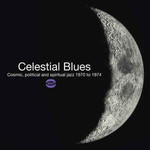
Celestial Blues: Cosmic, Political and Spiritual Jazz 1970 - 1974
 $35.00
Low Stock
add to cart
$35.00
Low Stock
add to cart
Various Artists
Celestial Blues: Cosmic, Political and Spiritual Jazz 1970 - 1974
[ BGP / CD ]
Release Date: Friday 16 September 2016
Should this item be out of stock at the time of your order, we would expect to be able to supply it to you within 4 - 7 business days.
Progressive jazz from the 1970s: music which has influenced Kamasi Washington and the Brainfeeder crew.
Something strange happened to jazz in 2015, an album by a previously under-the-radar session saxophonist broke through to international acclaim. "The Epic" by Kamasi Washington, an aptly named three CD set, paid homage to an era of jazz that had been rather overlooked. Sometimes called spiritual jazz, it dates from the latter part of the 60s and early 1970s. Many of the political and philosophical concepts of the time were used as guiding points for jazz's increased mysticism. Searching for deeper meaning, the musicians were looking for jazz's next great leap forward, while building on the post-bop and free jazz templates laid down by John Coltrane and Miles Davis, as well as contemporary sounds such as funk and soul, African and Middle Eastern music with touches of rock and contemporary composition.
This development was set against a background of American jazz at a crisis point. The neighbourhood clubs had begun to close as the jazz audience diminished; black Americans had found new sounds to dance to and enjoy. Jazz took on a new role, as its practitioners began to create challenging new music, providing hooks through funk bass-lines, boogaloo beats and sometimes vocals. This form was unlikely to ever enjoy large sales and could only be found on independent labels such as Prestige, Muse, Black Jazz, Strata East or Tribe.
Sales were modest and the records were somewhat ignored by jazz critics, but in the early 90s younger European collectors began to pick up on them, as did US hip hop producers looking for breaks and samples. They saw the records as part of the overall story of black American music, alongside those of Isaac Hayes, Donny Hathaway and Marvin Gaye, who had all absorbed many of the same influences and concerns.
These fans, and those who followed, recognised that Kamasi Washington was set on the same path. Not only with his "out" but not quite free saxophone, but the banks of vocals, strings and analogue keyboards. Artists including Carlos Garnett, Gary Bartz and Azar Lawrence - who all played with Miles Davis in his fierce early 70s period - are touchstones, but so, oddly enough, are Hammond organist Charles Earland and vocalists Dee Dee Bridgewater and Jean Carn.
"Celestial Blues" is a selection of music that complements the sound of "The Epic". If not its original sources, it includes something akin to the influences utilised by Kamasi Washington and his group as they have taken jazz to a new audience.
Tracks:
Gary Bartz NTU Troop - Celestial Blues
Joe Henderson & Alice Coltrane - Fire
Azar Lawrence - Warriors Of Peace
Charles Earland - Brown Eyes
Roy Brooks - The Free Slave
Joe Chambers - The Alomoravid
Carlos Garnett - Let Us Go (To Higher Heights)
Bayeté Umbra Zindiko - Let It Take Your Mind
Hampton Hawes - Josie Black
Oliver Nelson - Aftermath